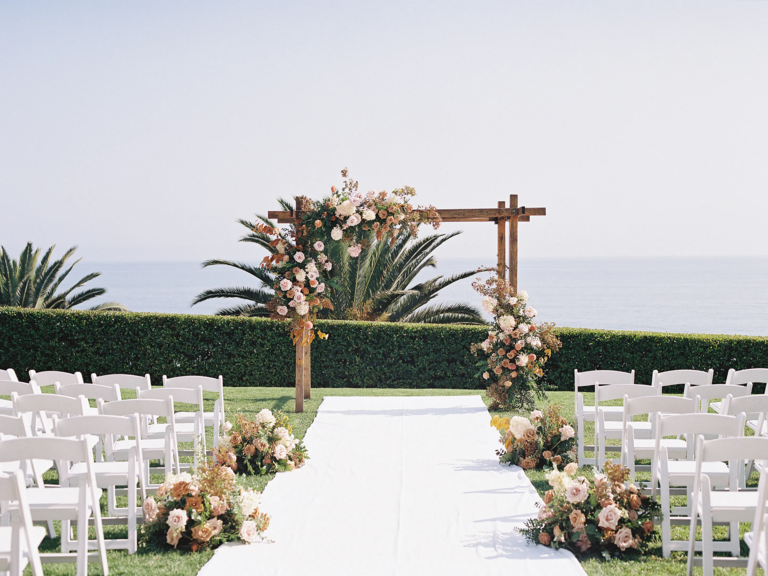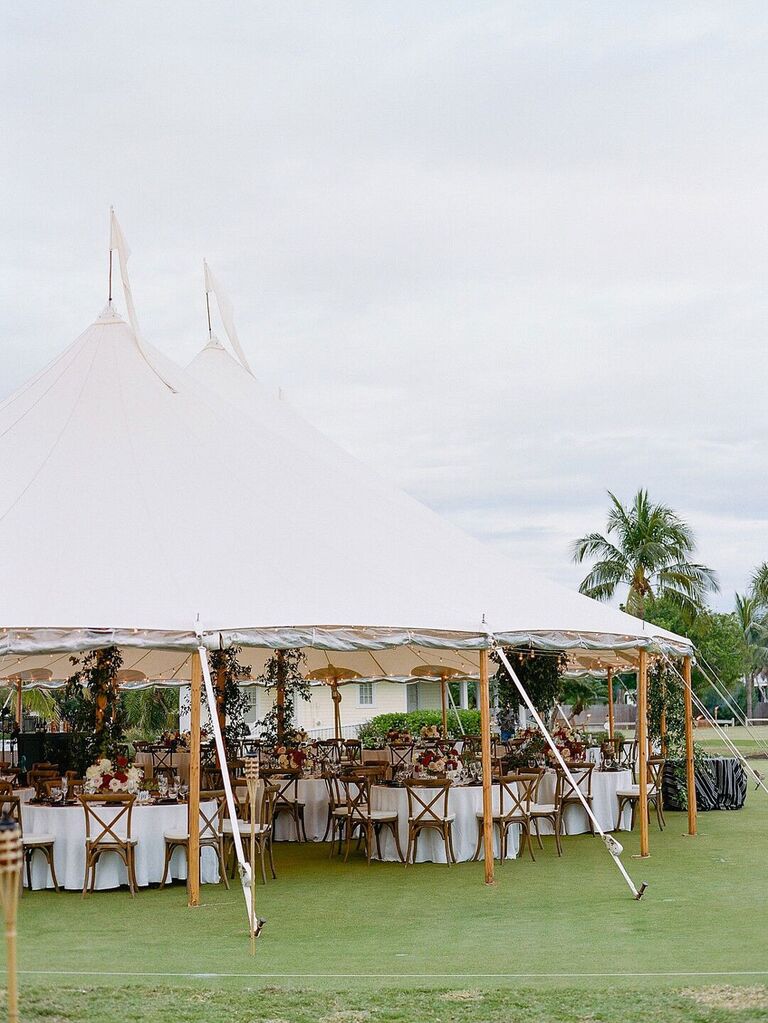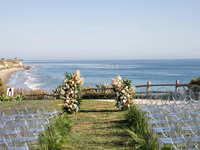The 7 Most Important Summer Wedding Tips to Know Before You Plan
With warm weather, blooming flowers and plenty of seasonal wedding theme inspiration, summer is a great time to say "I do." Since this season is one of the most popular times of year to get married, we've got a few summer wedding tips that should be top of mind to help you avoid any potential meltdowns when the day arrives. Hot temperatures and vacation travel schedules aren't the only concerns—but don't sweat it, we're here to help you every step of the way. Below, we're sharing seven important summer wedding planning tips you need to know, plus how to plan your wedding step by step.
What to Know About Planning a Summer Wedding:
Tips | How to Plan | Etiquette
Summer Wedding Tips
Between hot weather and outdoor venues, planning a summer wedding can come with its own unique set of challenges. Stay ahead of the game with these helpful summer wedding tips, straight from the experts.
Start planning early.
You don't have to start planning your wedding as soon as you get engaged—TBH, we always recommend taking a few weeks to soak in the experience with your partner before jumping into the details. But if you want to have a summer wedding, be prepared to start planning at least one year before your preferred date, or longer if possible. "We recommend that couples begin their venue searching process 16 to 18 months prior to the big day," says Clarissa Davis, Director of Catering at Chatham Bars Inn, a waterfront wedding venue on Cape Cod.
It's no surprise that summer is one of the most popular times of the year for weddings, but that means more competition for venues and vendors. The exact peak timing will depend on where you're getting married—and whether the summer season is shorter or longer—but in general, you want to start planning sooner rather than later to ensure you have the first pick. "Summer is our busiest time for weddings, and our peak season spans from May through September," says Lesley Blackburn, Area Director of Catering & Conference Services for Gurney's Montauk Resort & Seawater Spa and Gurney's Star Island. To get started, search for vendors using The Knot Vendor Marketplace to solidify your team of pros as early as possible.
Be flexible with your wedding date.
Because summer wedding dates are highly sought-after, prepare to be flexible with your preferred timing if needed. While you might want a Saturday afternoon wedding in June, you may be able to book more of your preferred vendors on a Friday evening or a Sunday morning—weekday weddings are also another option to consider.
Be mindful about selecting holiday wedding dates too. You certainly can host your nuptials on a big summer holiday like Memorial Day or the Fourth of July, but this could impact the number of guests who can attend (not to mention surge pricing around big holidays). Take these factors into consideration when selecting potential wedding dates. It's your day, after all, so feel empowered to make the decisions that best fit your vision—but keep those potential roadblocks in the back of your mind.
Invest in food and decor that withstands the elements.
While you shouldn't skimp on your wedding vision, it's important to be realistic about certain elements that will (and won't) work during the summer season—specifically flowers and food. If you're having an outdoor wedding, some blooms are known to wilt in hotter temperatures, like hydrangeas or gardenias. This doesn't mean you can't include them in your floral arrangements or centerpieces, but one summer wedding tip is to pair them with a few heat-resistant plants so that your flowers don't look too withered.
To avoid this completely, consider using durable summer wedding flowers and tropical plants, like succulents, anthurium, orchids, proteas or palm leaves. Work with your wedding florist to identify blooms that fit your theme and overall vision. Plus, when your photographer isn't snapping wedding photos, ask a bridesmaid to hold your bouquet in a shady spot or place it in a vase of cool water. If your blooms will be exposed to the summer heat for an extended amount of time, keep a spray water bottle on hand and give them a light mist every hour or so.
Warm weather should also be taken into consideration when planning your food and desserts too, because the last thing you want is a melted buttercream cake or ice cream bar causing a mess at your outdoor reception. Collaborate with your wedding caterer to plan a summery menu, and ask your venue to store your summer wedding cake (and other food offerings) in a cool place until it's time for them to be served.
Have a backup plan.
An old wedding superstition claims that rain on your wedding day is good luck. If you do encounter sprinkles (or worst-case scenario, a passing thunderstorm) on the big day, you'll want to have a backup plan. Most venues will have an indoor space reserved in case of inclement weather, but if not, you may need to be prepared to put up a last-minute reception tent if there's rain in the forecast. Working directly with a professional rental company is recommended, especially if you're hosting a backyard wedding at your own home or if your venue doesn't have onsite rental options. "Tents give you the ability to have a one-of-a-kind wedding nobody else can replicate," says Carey Bisonet, President of Alpine Events, an event rental company based in Michigan. "They can work at virtually any location, and they can be customized to be nearly any shape and size. The best part, though, is that they give you a blank canvas to create the exact, unique look you've always dreamed of."
And, while summer is notorious for high temperatures, evenings can get breezy too, especially if your wedding will be near the water. For late-night events near the beginning or end of the season, Bisonet also recommends renting outdoor heat sources. "Reserving items like patio heaters and sidewalls is highly recommended, especially for cool summer nights," he explains. "They'll be the perfect addition to keep your guests comfortable."
Prepare for hot temperatures.
Summer storms aren't the only potential weather-related complications you want to prepare for. Heatwaves and humidity can quickly take a toll on guests, so confirm that your venue has shaded areas, electric fans and air conditioning in case there are sweltering temperatures on your date. If you're hosting any events outside, consider providing sunscreen, sunglasses and parasols that protect against the sun. You might even want to supply bug spray for an outdoor ceremony. And the most important summer wedding tip of all: make sure there's a steady supply of ice water for everyone.
Give thoughtful wedding favors.
We always love a reason to be smart with your wedding budget and make the most of your investments. One of the best ways to do this, especially for a summer wedding, is to buy versatile favors. While wedding favors aren't required, some couples choose to give guests a thoughtful gift as a thank-you for attending. To get the most bang for your buck, look for favors that guests can use on your wedding day, like sunglasses, DIY personal fans, parasols or custom drink koozies.
Welcome bags are also an option that may be preferred by out-of-town wedding guests. One of our best summer wedding tips is to give guests a small goody bag that includes helpful products, like bottled water, travel-sized sunscreen or snacks for their hotel room. Guests will appreciate your attention to detail (especially if they've been traveling), and you can be sure that your money won't go to waste.
Consider hosting additional events.
It's no secret that summer is prime travel season. If you're hosting a destination wedding (or your nuptials are in a scenic location), consider planning additional events throughout the weekend so guests can turn your wedding into a small getaway. "In the summer, guests tend to be open to taking more days off to create a vacation around an event they're attending," says Davis. "Organizing additional activities in advance is a thoughtful option for them."
You might want to kick off your wedding weekend with a special happy hour event following the rehearsal dinner. On the other hand, you can never go wrong with a postwedding brunch the morning after. If you're familiar with the area surrounding your venue, share local sightseeing tips and activity recommendations to help guests get the most out of their trip when there's downtime. By encouraging guests to turn your wedding into a small trip, you'll get to spend more time with those you love most. "If guests turn your wedding into a mini-vacation, you'll have more time to interact with them on your big day," Davis adds.
How to Plan a Summer Wedding
Ready to dive into your summer wedding planning? Here are your top priorities in chronological order.
1. Make your wedding budget.
Creating a wedding budget is the first official planning task to complete because this will guide every subsequent decision. The average cost of a wedding fluctuates based on a variety of factors, but in 2023, the national average was $35,000, according to The Knot Real Weddings Study. The time of year can also impact your final bill, and since wedding services are more in-demand during the summer, some expenses may be higher compared to other seasons. Guest count, wedding style and whether or not you're getting married in a popular vacation area are other budget factors to consider.
With this in mind, be prepared to allocate more money for your venue and some vendor services. Work with your partner (and anyone else who might be contributing to your wedding, like your parents or in-laws) to set a budget that's realistic for what you can afford.
2. Set your wedding date and pick the venue.
With your budget on the table, the next step when planning a summer wedding is visiting potential venues and setting the date—but it's a chicken-or-egg situation as to which one comes first. You can either tour potential wedding venues and ask about their available summer dates, or pick your wedding date first and visit venues based on their availability. Either way, start the process by browsing The Knot Vendor Marketplace to find wedding venues based on your location and budget (you can even filter the results based on outdoor space, guest capacity and our Best of Weddings award winners).
3. Create your guest list.
Wedding date: Check. Wedding venue: Check, check. Now that you know exactly when and where your summer wedding will be, it's time to figure out the "who." Making your wedding guest list should be a joint effort between you and your partner, but it's also important to give some say to your parents or anyone who's contributing financially to the wedding. Set aside time to decide who you really want to invite, and make ground rules about inviting kids to your wedding or who gets a plus-one. Remember that your save-the-dates should be sent at least six months before the wedding—and you can't send them until you have your final guest list—so you definitely don't want to leave this step to the last minute.
4. Choose a color palette, theme and decor.
Summertime is the perfect season to experiment with bright, bold wedding colors and statement details, like a stunning wedding arch framing the view at an outdoor venue. Decide if you want a specific theme for the day—seashells and nautical details are common beach wedding ideas, or you could go the classic route with a romantic garden-themed wedding.
5. Shop for your wedding attire.
If you're saying "I do" in the midst of summer, keep in mind that some fabrics and styles will be more comfortable than others. As you shop for your summer wedding attire, look for breathable fabrics that won't feel too hot or stuffy outdoors, like chiffon, silk, linen and cotton. You can also use this as an opportunity to change into a comfortable reception dress or second look after the wedding ceremony. Follow these guidelines when searching for bridesmaid dresses and groomsmen attire as well—trust us, your wedding party will thank you for it. Finally, take the weather forecast into account when planning your wedding hairstyle and makeup, too.
6. Decide on your wedding menu and cake.
The summer season is synonymous with fresh, light dishes, seafood and backyard barbeques. If you're looking for creative summer wedding food options, lean into seasonal ingredients for your menu. "Look to the local and seasonal offerings for food and beverage ideas," says Blackburn. "Local produce, fresh herbs and wildflowers will add a wonderful touch to your menu, and they'll bring your location to life through the small details."
Plus, planning your menu around local influences will give your wedding day a personal touch that can't be replicated. "Highlighting food that represents a couple's hometown or venue location is a delicious way to add meaning to a wedding," says Tamara Keefe, owner of Clementine's Naughty & Nice Creamery in St. Louis, Missouri. "Adding bits of history and tradition are what make a wedding memorable and extremely personal to the couple—and the easiest way to do so is to offer the most popular menu items from the city's most iconic restaurants."
There are plenty of meal options that'll amplify the season, from a nautical clambake to a casual barbeque. We also suggest offering a few summery signature wedding drinks too. You can't go wrong with fruity sangria, popsicles in champagne, wine spritzers or citrusy mojitos. Summer is also unofficially known as "rosé season," meaning it's the best time of year to serve guests this popular pink wine—or even better, a summery rosé cocktail.
"Since many people choose to host summer weddings outdoors, chilled rosé is one of the most refreshing beverage options you can choose," says François Matton, third-generation co-owner of Château Minuty, a renowned winery in southern France. "It's an extremely versatile wine that can transition beautifully from aperitifs to the dinner table, and it's even a great option to enjoy on the dance floor. My favorite way to enjoy rosé is as it is, but it can also make a refreshing signature cocktail inspired by its own flavor profile and aromas."
Your wedding caterer and bartender will have a robust understanding of local dishes and seasonal flavors worth highlighting on your summer menu, so rely on their expertise to create a list of beverages, snacks, entrées and desserts that'll leave guests raving about their meals.
7. Finalize the remaining details.
Once the big to-dos are out of the way, you can shift your focus to any remaining details, like creating your music wishlist to share with your wedding DJ, finalizing the seating chart and practicing your vows. Start packing your wedding day bag or wedding day emergency kit and be sure to include summer essentials, like extra deodorant, face blotting sheets and sunscreen.
Summer Wedding Etiquette
If you still have some questions about planning a summer wedding, here are our thoughts on a few of the most common concerns and gray areas.
What is considered a summer wedding?
Summer weddings take place during the months of May, June, July and August—or in other words, the time between Memorial Day and Labor Day. Depending on where you're getting married, summer-like weather may start in late spring and extend into early fall. Although those times of the year aren't officially part of the summer season, the warm temperatures are still ideal for incorporating some of your favorite summer-inspired wedding ideas.
What time should a summer wedding start?
The best time of day for a summer wedding is late afternoon or early evening. Heat and direct sunlight are two things to keep in mind when you're deciding what time your summer wedding should start, especially if any part of the event will take place outdoors. In order to make sure your guests (and you!) are comfortable, the start time should be when the sun is relatively low in the sky after the hottest part of the day has passed, usually between 4 p.m. and 6 p.m. depending on the location. If you'd prefer a morning wedding, plan to have everything wrapped up (or at least be celebrating indoors) by midday when temperatures are most likely to be the hottest.
How hot is too hot for a summer wedding?
Everyone's tolerance to heat is different, but temperatures above the mid-80s are most likely too hot for a summer wedding unless you're getting married indoors with fans or air conditioning. Humidity and direct sunlight can bump the temperatures up a lot more than you might expect, so remember to take those into account, too. Hot weather can quickly become uncomfortable—and even dangerous—if your guests are sitting in one place for more than a few minutes (for example, an outdoor ceremony), so it's better to err on the side of caution if you're not sure. If necessary, move the wedding indoors, push the start time to later in the day or provide lots of methods to cool down, like handheld fans, umbrellas and ice water.
Samantha Iacia contributed to the reporting of this article.


























